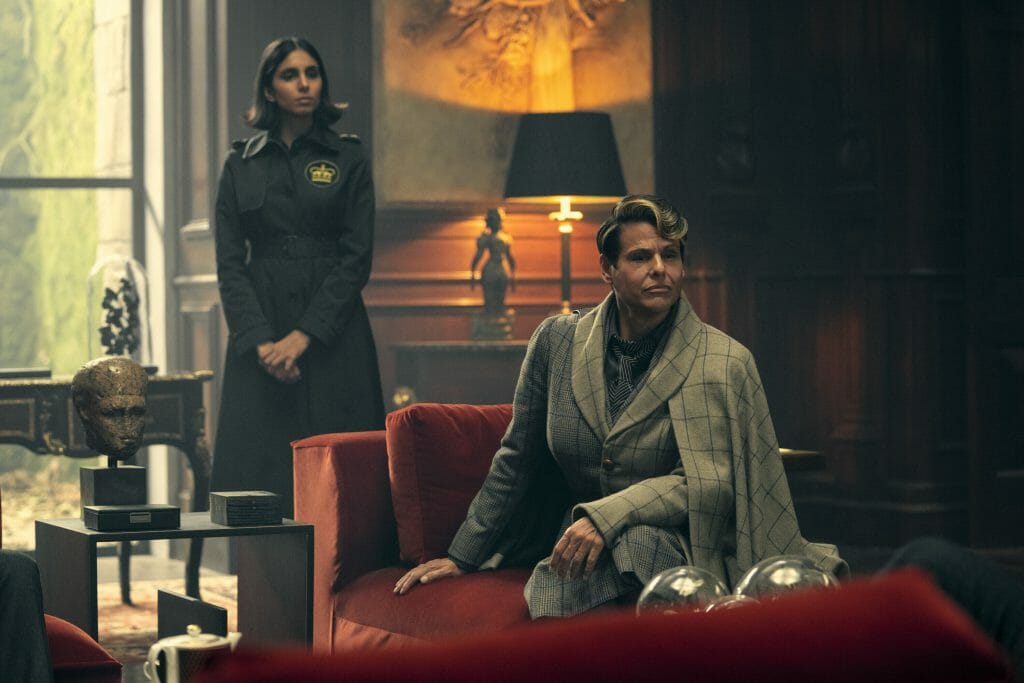From Madame Horrible in Wicked to Davina in Transparent, we’ve seen Alexandra Billings play many characters — but not quite like the one she plays in The Peripheral.
Based on the sci-fi novel of the same name by William Gibson, Billings stars as Ainsley Lowbeer in the Prime Video sci-fi series joining Chloe Grace Moretz, who plays Flynne Fisher. Set in the rural American South, Flynne works at the local 3D printing shop, while making extra money playing VR games for rich people. One night she puts on a headset to be transported 70 years in the future in London. However, she realizes that it isn’t virtual reality… it’s actually real. Flynne searches to discover who has connected their worlds.
Billings’ character is considered an “Ancient Noble” who is practically omniscient. She loved taking on the role.
“I loved that that description begins with the word, ‘ancient’… that’s brilliant,” Billings told GLAAD’s Anthony Allen Ramos. “Yes I am 110 years old so that is the great thing about this character… I’m a bit of a blithering idiot and a bit of a dreamer. Lowbeer is this cerebral analytical highly intelligent. I mean, she’s flesh and blood, but she’s a bit like a machine, I equated with The Terminator — especially intellectually. She just focuses and it was great playing her because it rewired my brain. I think in the abstract and for about two months I was like super smart, figuring things out. It was so great.”
Billings considers herself a “sci-fi freak” so The Peripheral is right up her alley. She loves the action and the visual effects but for her, it goes beyond that. She loves how she, Moretz and T’Nia Miller play women who represent the world at large.
“None of us depend on any other human for our power, strength and intelligence,” she explains. “We all rely on this and this other guiding force. That, for me, is how the world globally. How the world is changing and how these stories, especially through these three lenses are able to talk about familial love and also how to [change] stuff. It’s not just a sci fi show… you get a lot of bang for your buck.”
She added, “Also, it is a true reflection on what we’re experiencing socio-politically right now, especially with these three characters as the central figures.”

This representation of women is wildly important — especially in the current landscape where rights of women and queer people are being threatened. In particular, Billings waxed poetic about marriage equality.
“Look, here’s the deal. I’m 60 years old. I’ve lived through two now, two viral plagues. The first one murdered [almost] every single friend I had in the 1980s and 1990s,” she said. “The second one in which we lost a lot more people. The reason I talk about that is because it’s important for queer people to understand what happened.”
She continued, “Here’s what happened in the first viral plague: all of us were annihilated and the government said, ‘I don’t understand what the problem is’. In the second viral plague, when the cis white heteronormative humans began to be affected, we had a vaccine within a year, right? It’s very important that we understand the difference between those two experiences because that is how the government, not just in our country but globally thinks about the queer community. As long as it’s killing us, it’s killing all the right people — and I don’t just mean physically. I mean emotionally and spiritually.”
Even though there are people — queer or not — that claim marriage equality isn’t important to them. Billings has a few choice words for them.
“You’re a coward,” she said bluntly. “And the thing that you’re running from is your own identity and that’s fine… What we’re talking about is the legalization of who we are as an ancient community. That’s what we’re talking about… that’s what’s important.”













